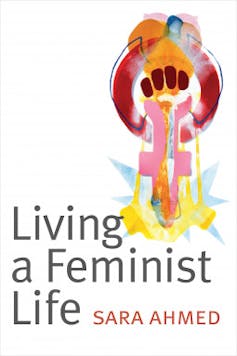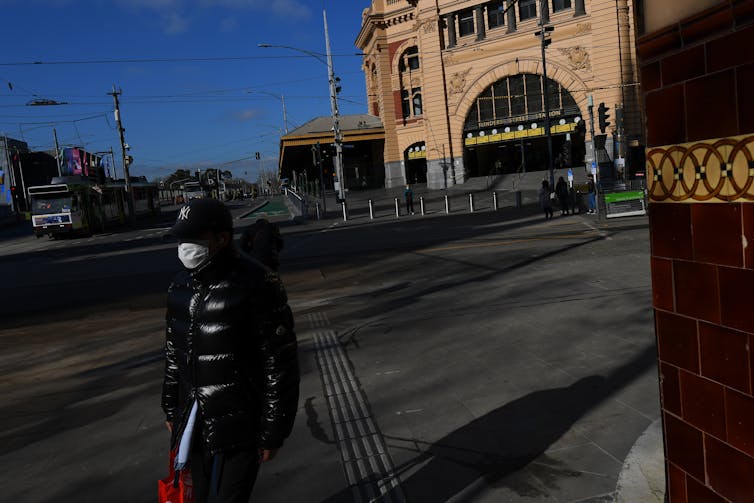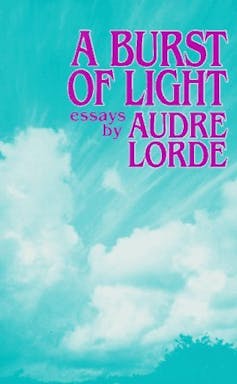As Hannah McGregor describes, Secret Feminst Agenda is a “podcast about the insidious, nefarious, insurgent, and mundane ways we enact our feminism in our daily lives”, writes Yves Rees, from La Trobe University.
In our series Art for Trying Times, authors nominate a work they turn to for solace or perspective during this pandemic.
In her 2017 book Living a Feminist Life, Sara Ahmed advocates the necessity of a “feminist killjoy survival kit”, her name for the assemblage of books, things, tools, creatures and joys that enable feminists — and feminism — to survive.

When the world is exhausting, when life grinds you down, the Survival Kit is the place feminists turn for nourishment and solace. More than just an exercise in neoliberal selfcare, Survival Kits are about sustaining a community and a political project.
Needless to say, my Survival Kit has been getting a heavy workout in 2020. Coronavirus, climate collapse, economic downturn, the implosion of higher education, resurgent fascism, celebrity transphobia— not mention my own gender transition: it’s a lot.
What I’ve craved, to survive these times, is communion with like-minded souls, fellow queer bookworms who’ll share my horrified fascination with a world in flames. But in this age of social distancing and repeated lockdowns, communion is hard to find — especially for us more than two million Australians who live alone.
This is why a treasured item in my Killjoy Survival Kit is a podcast that beams whip-smart feminist conversation into my home, allowing me to eavesdrop on the latest musings of a fellow traveller each week.
Secret Feminist Agenda is the creation of Canadian academic Hannah McGregor, a literature scholar at Simon Fraser University in Vancouver. As McGregor describes, it is a “podcast about the insidious, nefarious, insurgent, and mundane ways we enact our feminism in our daily lives”.
Now in its fourth season, the podcast alternates between interview episodes and shorter “minisodes”, in which the dauntingly articulate McGregor monologues on a topic front of mind.

Soundtrack to the Sisyphean
Every Saturday morning for the past two years, the latest episode has provided the soundtrack to the Sisyphean drudgery of laundry and housework. In the process, McGregor’s voice has become as familiar as my own. As podcasting critics have noted, you develop a special kind of intimacy with someone who whispers into your ear as you scrub the toilet each week.
What makes this podcast stand out in an increasingly rich podcasting landscape is its unique blend of brain and heart. McGregor is an intellectual greyhound, and she brings a fierce scholarly rigour to each episode.
But she has an equally fierce commitment to a “feminist politics of care”, showing that softness, humour, pleasure and even cosiness are values that must be central to a truly emancipatory feminist politics.

More than anyone, McGregor has made me realise the truth of Audre Lorde’s vision of selfcare as warfare. For oppressed groups like women, people of colour, and queer and trans people, using selfcare to ensure one’s own survival can itself constitute political resistance. As Lorde wrote, and both Ahmed and McGregor cite, “Caring for myself is not self-indulgence, it is self-preservation, and that is an act of political warfare.”
By exploding the Cartesian mind-body divide, McGregor gives us an embodied, feminised model of intellectual excellence — one that provides a much needed alternative to the still ubiquitous vision of “the scholar” as a white male automaton with a wife looking after things at home.
In the process, McGregor helps us imagine a world where academia could discard its masculinist culture of hyper-competitiveness, punitive benchmarks and elitist gatekeeping. As embattled Australian universities discard their armies of casuals and push surviving staff towards ever greater “efficiency”, we need more than ever to envision and fight for a better university.
Secret Feminist Agenda also expands the boundaries of academic knowledge production. By having the project peer-reviewed via a university press, McGregor makes a case for the podcast as a legitimate form of scholarship.
In doing so, she shows that “scholarship” can be pleasurable, collaborative and —most importantly — accessible to a broader public. This example has been crucial to development of my own podcast Archive Fever, co-hosted with historian and author Clare Wright.
On a more personal level, Secret Feminist Agenda has given me specific tools to think with as I — like McGregor — navigate life as a queer, single, white, vegan, millennial feminist academic living on stolen Indigenous land.
Episode 2.3 helped me discover my inclinations towards asexuality and aromanticism (little or no romantic attraction towards others). Episode 3.17 spoke to my growing qualms about veganism, dissecting its links to white supremacy and disordered eating. Other episodes pushed me to confront how my workaholism reproduces the productivity fetish of late capitalism.
And many episodes have illuminated instructive parallels between Canada and Australia, twin settler colonial nations struggling to come to terms with entrenched racism and genocidal histories.
‘It’s okay not to be okay’
Finally, the podcast has been a treasure trove of reading recommendations. Both the interviewed guests, and each episode’s show notes, have led me to books that have transformed my world.
Best of all, McGregor is as delightful in real life as she appears on the podcast. We met once, back in 2018, when I visited Vancouver for a conference. We feasted on vegan ice cream and she introduced me to her beautiful and troubled city. Just like her podcast, it was the perfect blend of pleasure and politics, radical sweetness infused with a dash of bracing vinegar.
As I approach my five-month anniversary of lockdown, this memory has itself become part of my Survival Kit — a reminder life once contained sociability and travel, and will one day do so again. In the meantime, I have McGregor in my ear to remind me that “it’s okay not to be okay” when a pandemic upends life as we know it.
Yves Rees, Lecturer in History, La Trobe University
This article is republished from The Conversation under a Creative Commons license. Read the original article.


